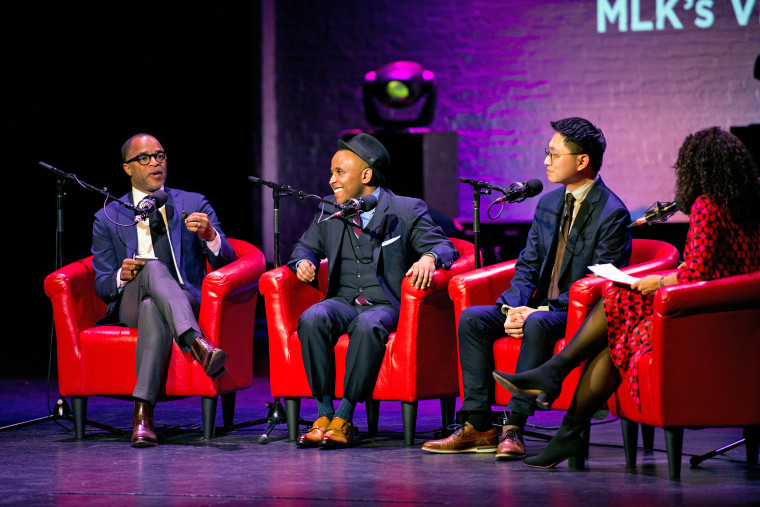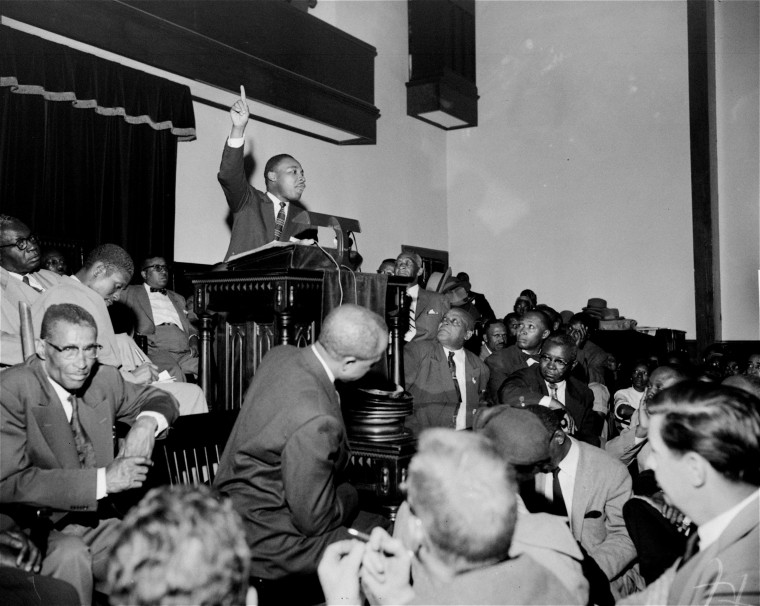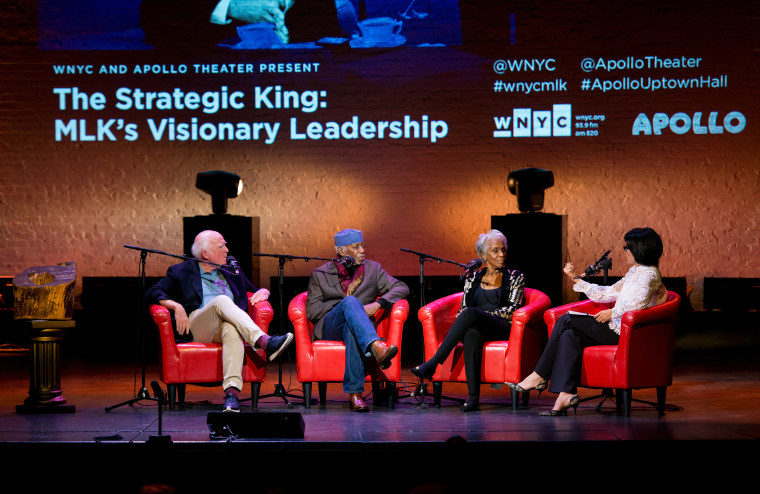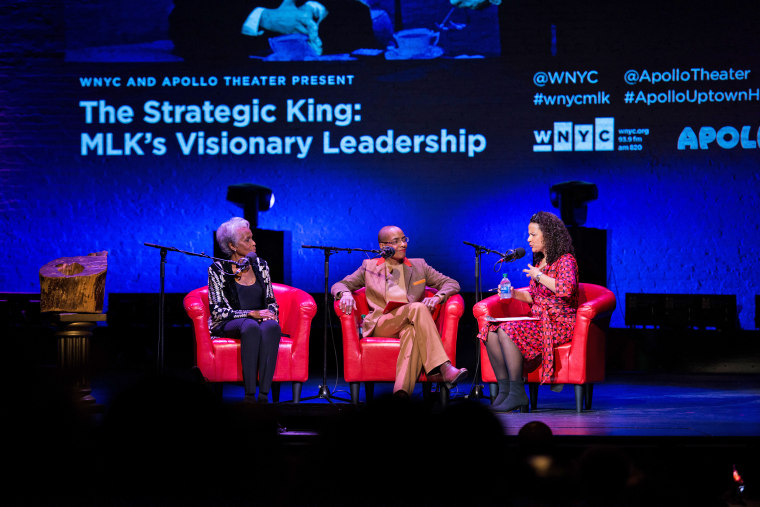For all the veneration in which he is held as a civil rights titan, a spirit-elevating orator and an unwavering peacemaker, there are still measures of Martin Luther King Jr., who would have been 91 last week, that remain unsung.
Among them were his roles as a risk-taking strategist, a cunning negotiator and an unflinching adherent to the best traditions of the black church.
"First of all, oftentimes when people talk about Dr. King and the influences upon Dr. King's actions and his nonviolence commitments, they talk about [Mohandas K.] Gandhi or they talk about his study at Boston Theological Seminary," said the Rev. Kelly Brown Douglas, a theology professor and dean of Episcopal Divinity School at Union Theological Seminary in New York. "But they fail to mention that he was a son of the black church and it was his very black church faith that compelled him into the movement."
Brown Douglas was one of several historians, journalists, poets, theologians, performers and social justice practitioners, including former Poet Laureate Natasha Trethewey, MacArthur grant recipient Carrie Mae Weems and Dorothy Butler Gilliam, the first black female reporter at The Washington Post, who recently came together to dissect, explain and praise King.
Last week's gathering, "The Strategic King: MLK's Visionary Leadership," was part of the 14th annual Dr. Martin Luther King Jr. Day celebration in New York. The live broadcast event is produced by public radio station WYNC, and for the seventh year it was staged in partnership with the Apollo Theater.

This time it was dedicated to Rep. John Lewis, D-Ga., who is battling cancer. His stalwart civil rights career began when he wrote King a letter and King replied with an invitation to join the budding movement. The event is available in its entirety on the station's website.
Were he around today, said Brown Douglas, King would be critical of the faith community in general and of some segments of the black church specifically, those that function as "thermometers" and not "thermostats."
"It's not following but leading the way. They are taking the temperature and seeing what's popular, what's profitable, what's political, as opposed to being the thermostat and taking the temperature of a more just future and seeing what's right and what's wrong," she said. "It seems to me that what we need other than a hashtag are bold voices of moral leadership."

One of those contemporary bold voices is Rashad Robinson, president of Color of Change, a racial and social justice organization that boasts more than 1.4 million members, which uses comprehensive media strategies to address structural racism and inequality.
Robinson said Color of Change began in the aftermath of Hurricane Katrina in 2005, when the nation saw that "black people were literally on their roofs begging for the government to do something and they were left to die."
"And Katrina didn't illustrate new things, right? It showed things we already knew: geographic segregation, generational poverty, impacts of what we have done to our planet and so many other systems," Robinson said. "But at the heart of Katrina, no one was nervous about disappointing black people — government, corporations and media."
"When institutions are not nervous about disappointing your community," he added, "it doesn't matter what kind of research report you have that illustrates all the facts and figures and details, and sometimes it doesn't even matter what you do in the courts if you don't have the power to implement it."
Robinson said Brown v. Board of Education is a "perfect example of where our schools are at in terms of segregation right now. The question of media strategy isn't just about getting our stories out, but getting our stories in!"
King understood that and worked to level the playing field by employing strategies that at the time seemed too dangerous and destined to end in tragedy.
Take his willingness to let children risk life and limb to protest in Birmingham, Alabama.

"This was the biggest gamble of his career," said the author and historian Taylor Branch, whose first book in a trilogy about the civil rights movement, "Parting the Waters: America in the King Years, 1954-63," was awarded the Pulitzer Prize.
"Most people on the staff and all the black parents in Birmingham were against it. We have to remember it's 6-, 8-, 10- and 12-year-olds marching into those dogs and firehoses," Branch said.
"It's the little kids that did this and broke the emotional back. … That was a tremendous angst-filled decision, and people said things like if they're old enough to decide to be baptized and determine their eternal destiny, then they're old enough to march into these dogs and firehoses," he said.
"That's easy to say when you know it's going to work, but when you don't, then it's very difficult," he added. "Everyone was against it. Bobby Kennedy was against it. Malcolm X was against it. You know, how can you send children out to do your battles?"
Branch said, "The movement was constantly unsettled."
To bring some balance to the movement, King had to find willing partners in the highest office in the land. And while his relationships with Presidents John F. Kennedy and Lyndon Johnson are well documented, less known are his dealings with President Dwight Eisenhower at the dawn of the civil rights era.
"So, Eisenhower generally gets short shrift in the longer story about the civil rights movement, but it's an important setup for Dr. King," said Khalil Gibran Muhammad, a professor of history, race and public policy at the Harvard Kennedy School.
"Eisenhower desegregates the armed services, desegregates military bases. He is responsible for ultimately putting pressure, through the Justice Department, for support of what would become the Brown decision," he said. "All that matters, because King is watching closely how Eisenhower is both allowing for the kind of infrastructure that will take place and at the same time putting public pressure on him."
King had to toe a much stricter line when dealing with the White House. But the event that would galvanize power brokers and that still resonates through history was the March on Washington in 1963.
While many had predicted violence, once it was over and had been hailed as a success, reporters asked Kennedy to comment.
And he replied: "I have a dream."
